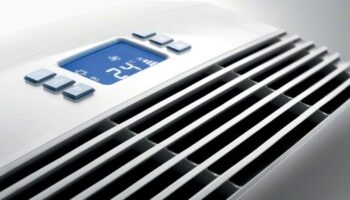We've independently reviewed this article to make sure it's as accurate as we can make it.
To find out more about our article creation and review process, check out our editorial guidelines.
Portable air conditioners are a practical solution for indoor air cooling. They are easy to install and can be up and running the second you bring them home from the store. But how long service life can you expect from a portable air conditioner unit?
A portable air conditioner lasts about 10 years. If you treat it well, you can get another 5 years or so of service life. You can double the lifetime of the unit by using it infrequently or by making sure it has a low cooling load.
Now an air conditioner is a complex machine. Many factors can shorten the lifespan of a unit. In this post, we go over how long the portable ACs last and what you can do to keep yours alive longer!
How Long Do Portable Air Conditioners Last?
Eventually, all devices with moving parts break. So will your portable air conditioner.
Parts of air conditioners that break (eventually)
• Evaporator Fan
• Condenser Fan
• Compressor
Some of these components are easy to fix, while some are very expensive and hard to fix. If a fan stops working, it is generally not that big a problem. The fan can be replaced, and your AC kept alive a bit longer. Repair costs can often increase depending on your location. If it’s harder for a professional to reach you, you’ll end up paying more in labour fees.
If you want to get any replacement part – or see how much one would cost – click to enter your model number in the search bar below. Our partners at AppliancePartsPros stock almost every part with free guides on how to install them.

If the compressor breaks, on the other hand, that is usually the end of the unit. Also, if any parts of the system develop a refrigerant leak, that too means it’s days are numbered.
Confused about refrigerants? Check out our guide to them here!
A portable air conditioner is, however, a very reliable piece of equipment. The design lifetime of portable air-conditioners is 10 to 15 years. If it is used correctly and serviced adequately, this usually is how long it lasts.
The operative words there being “used correctly” and “serviced properly.”
The amount of wear and tear on a portable air conditioner varies between different settings and different environments. In a small bedroom, it will last a lot longer than in a big garage, for instance.
Factors that shorten the life of your portable air conditioner
- Dirty rooms
- Lack of care/maintenance
- Overuse (i.e. too large of a space)
- Incorrect air conditioner installation
Dirt is a common factor that reduces service life. Particles in the indoor air, such as dust or hair, clog the filters and reduce the efficiency of the unit. If filters are not cleaned regularly, the unit can overheat and stop functioning altogether.
The cooling load on the air conditioner also affects its lifespan. It is how much work the AC needs to do, so it directly affects the service life.
An air conditioner is designed to be used in a room up to a specific size. It is supposed to run for a while and cool the room. After this, it needs to “rest” for some time before cooling again. If you use it in a bigger place than it was designed for, it does not get the downtime periods. This leads to overheating problems and shortens life.
Incorrect installation can also affect how long your portable air conditioner lasts. Air conditioners operate by moving heat from the inside of your home to the outside. A standard one hose portable air conditioner it does this by sending warm air out through the hose.
If the hose is leaking or if it does not have a tight fit by the window, hot air can leak back in. These leaks will lead to a more significant load on the portable air conditioner and shorten its lifespan. It is also not a good idea to make the hose longer, this can lead to similar problems.
The lifetime varies, naturally, with the quality of the unit. A cheaper brand of portable air conditioner is likely aiming at the 10 years mark of service life. The higher-end brands are probably aiming at 15 years and sometimes even more.
Why do portable air conditioners break?
Portable air conditioners break because a critical component stops working. They always break at some point as a result of normal wear and tear. This is normal for all air conditioners.
Unlike a fixed installation or a window air conditioner, a portable air conditioner is entirely inside the room that it is cooling. This means that for most portable air-conditioners, they will take both the air to cool and the air to use for cooling from indoors. This means that the units can clog from indoor dust both on the hot side and cold side.
A portable air conditioner is at a higher risk of clogging because of this. Clogging causes the unit to run warmer, and this increases the wear and tear, resulting in a shorter life.
What factors affect the lifetime of a portable air conditioner?
How big a room an air conditioner has to cool substantially affects the lifespan of the unit. This can be a bit hard to judge. But as long as the unit is used in a room smaller than it’s rated capacity, it will do fine.
We love our pets very much, but our air conditioners have a more precarious relationship with them. Animals increase the number of particles in our indoor air. Furry animals, in particular, do this. They shed! Hair and other dirt from out animals quickly find their way into air conditioners.
The hair and particles clog the air filters and sometimes even the unit itself. If the clogging is left unchecked, it may lead to a drastically shortened lifetime.
Always clean the filters of your unit, particularly if you have pets.
Keeping the room, the AC is in clean and, if possible, off-limits to pets will help your AC as well.
Signs your portable air conditioner needs maintenance
These are some signs that your air conditioner might need maintenance. Sometimes a good cleaning is all it takes to get your unit back up and running.
- Air Conditioner Maintenance Indicators
Not Cooling - Blocked or low flow
- Water dripping out
Nasty smells - Makes different noises
- Frequent starting and stopping
- If your unit is not cooling, it means it needs to be serviced right away.
The same goes if it is starting and stopping frequently.
Starting and stopping can mean that there is something wrong with the electronics in the unit.
A change in the noise that the portable air conditioner makes can indicate that something is wrong. This is both if it makes more noise or if it makes less noise.
If it makes more noise, this can be because something inside is either broken or working too hard. Cleaning the unit is a good idea, but if the noise persists, service might be necessary.
A reduction in noise can also be a problem. The parts in an air conditioner that makes sound are the fans and the compressor. If the noise goes down, this is usually because either of the fans or the compressor has stopped working.
If your AC is not blowing as much air, this may be due to clogged filters. To test, you can put your hand over the cold air outlet when the unit is running. If it is very little or no flow, refer to the manual of your unit for cleaning instructions.
If your unit smells funny, this is probably due to bacterial activity inside the unit. Parts of the unit have been clogged with dust from the area that it is cooling. This dust has then gotten wet and is now decomposing inside the unit.
To fix this, clean out the unit thoroughly. Again, follow the instructions in the manual. Be sure to clean the heat transfer surfaces, as well. That is the parts that are made of metal inside the unit.
Long live the portable air conditioner
In closing, portable air conditioners will last a long time. They need a bit of taking care of and a job they can actually manage to do. But when they have this, they last for quite some time.
If you are buying a new portable air conditioner, you can think of these things to increase the service life:
- Make sure you size it correctly. Too small of an air conditioner for the space and it’ll quickly run itself into the ground. However, too large of a unit isn’t good either – that can lead to mold and air quality issues due to short runtimes, so it doesn’t run long enough to extract moisture. All of this can lead to a cold and clammy house. It’s very much a goldilocks type situation! You want to make sure you get the right-sized portable unit for your space.
- Perform regular maintenance. Once or twice a year give the AC a good clean and replace any filters.
- Be cautious with your thermostat. Don’t expect your air conditioner to turn your room into an ice-party. Try to set it to a temperature that’s comfortable, but won’t overwork your AC.
- Consider getting a two-hose air conditioner. A two hose system portable air conditioner does not have the same clogging issues like the one hose variant. You might want to consider this if you have pets.
Regardless, your AC will be with you for many years. Keeping you and your home cool when needed!







